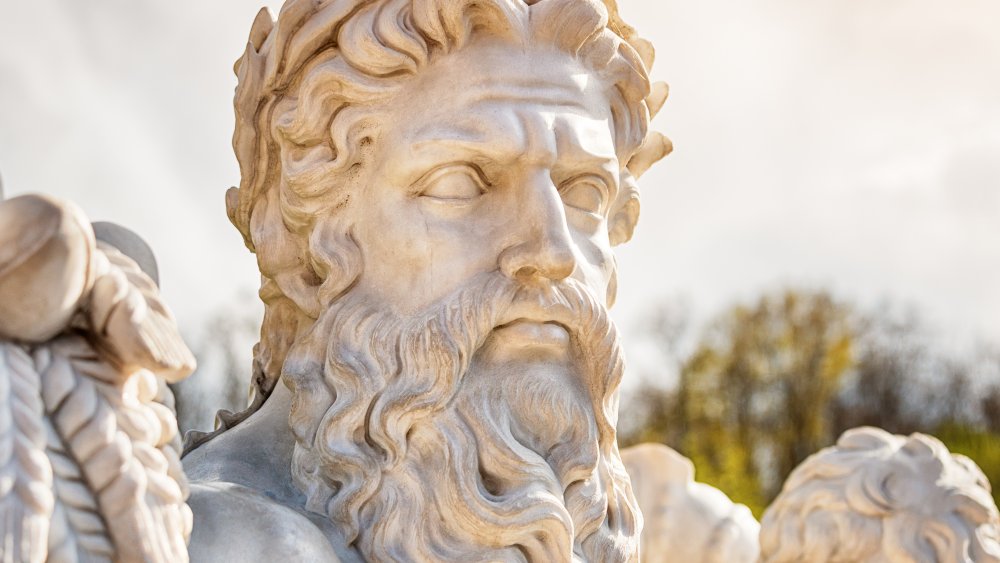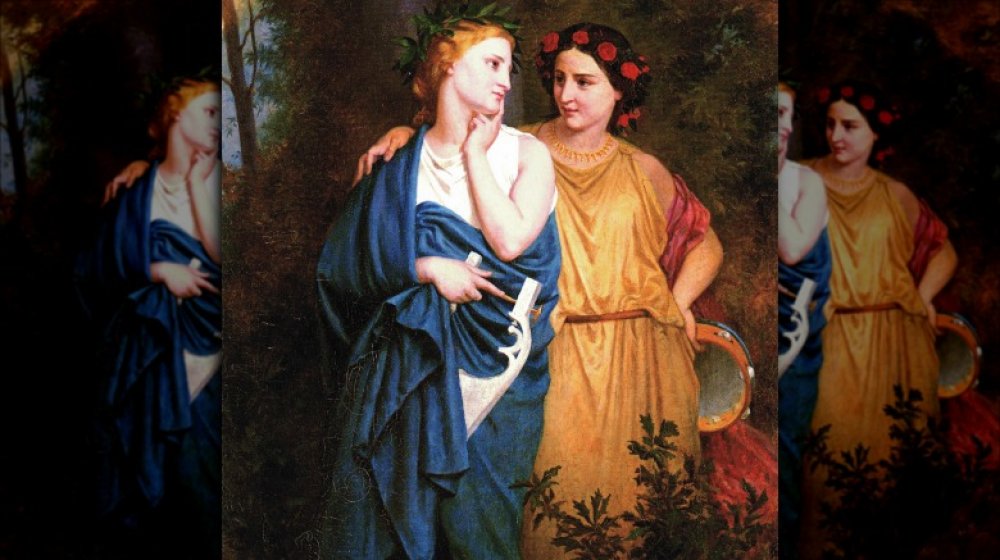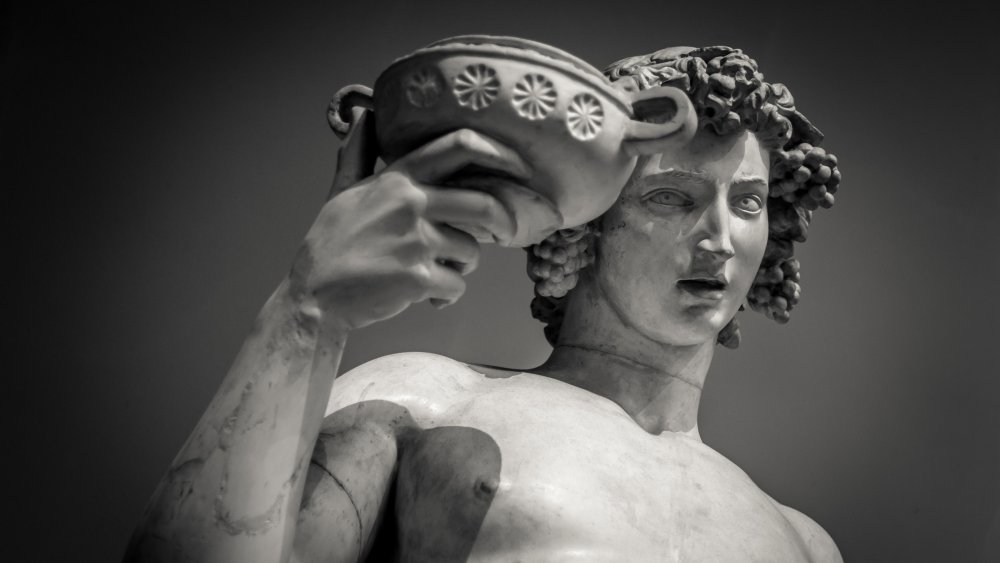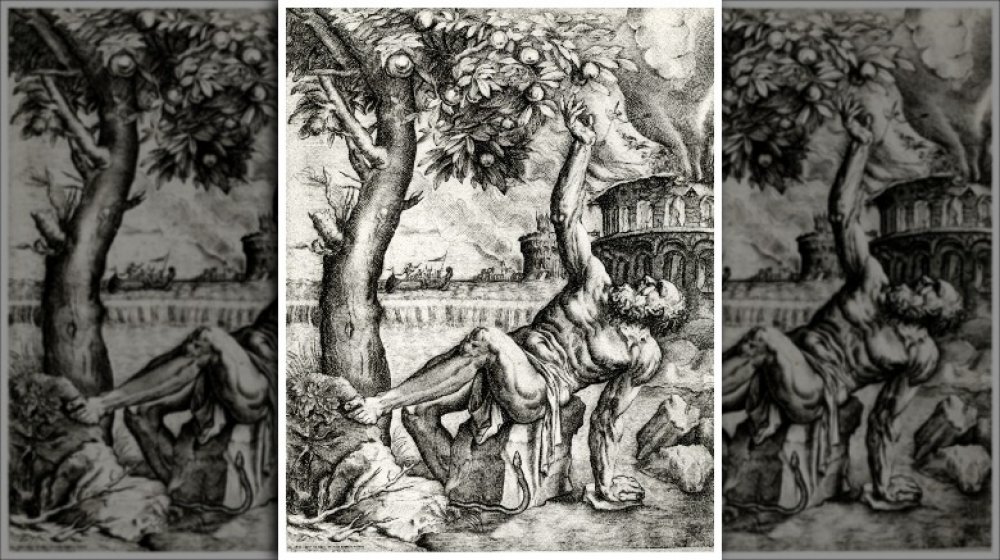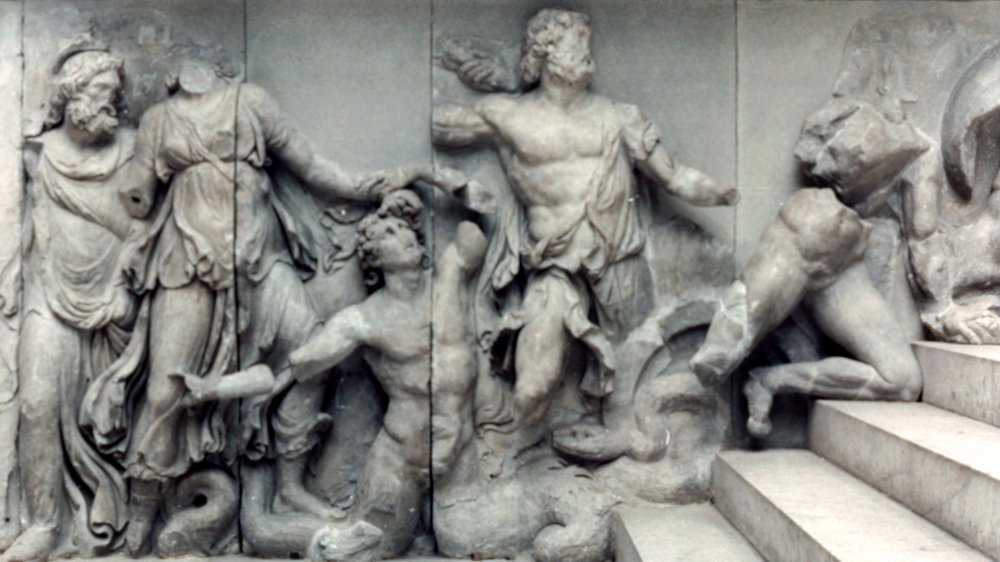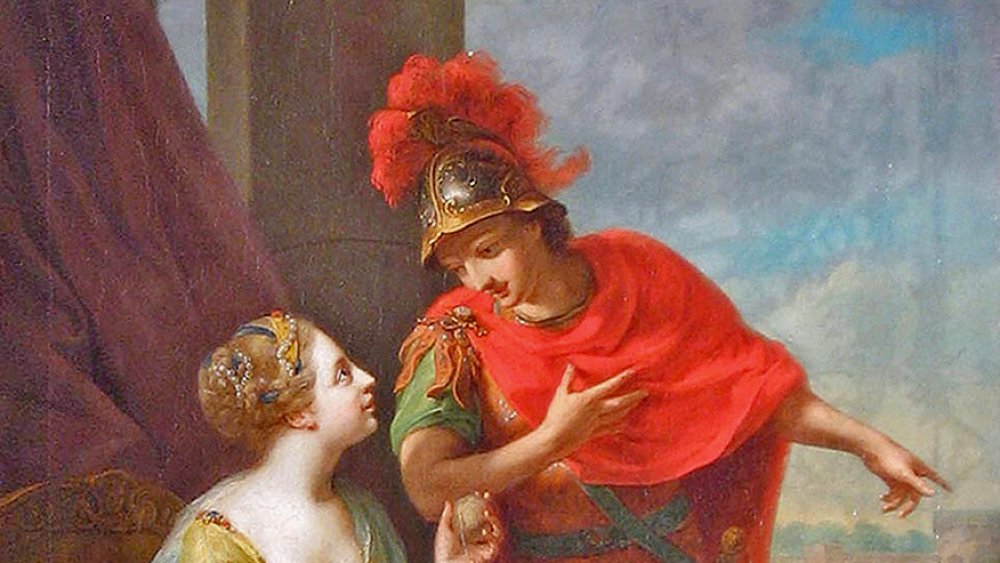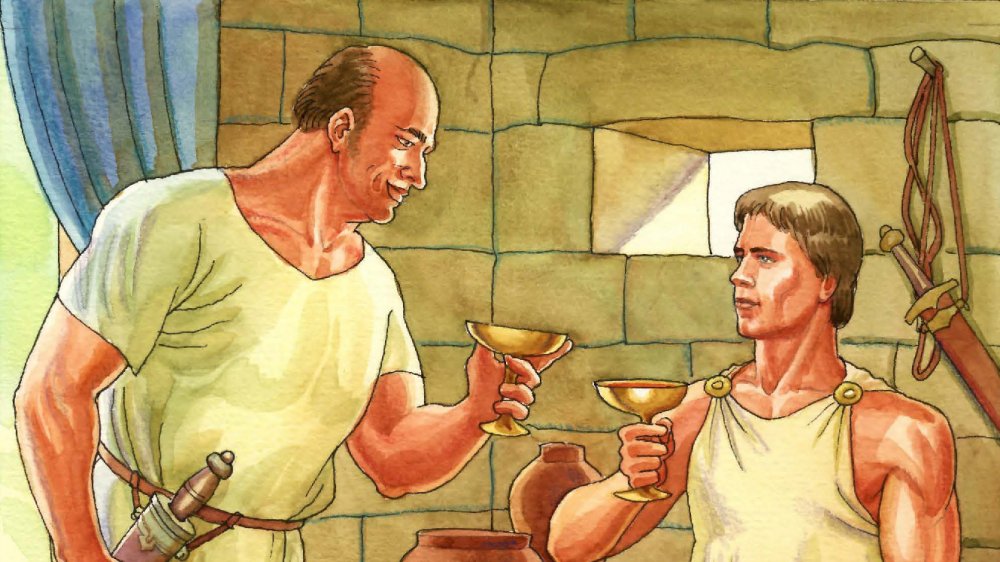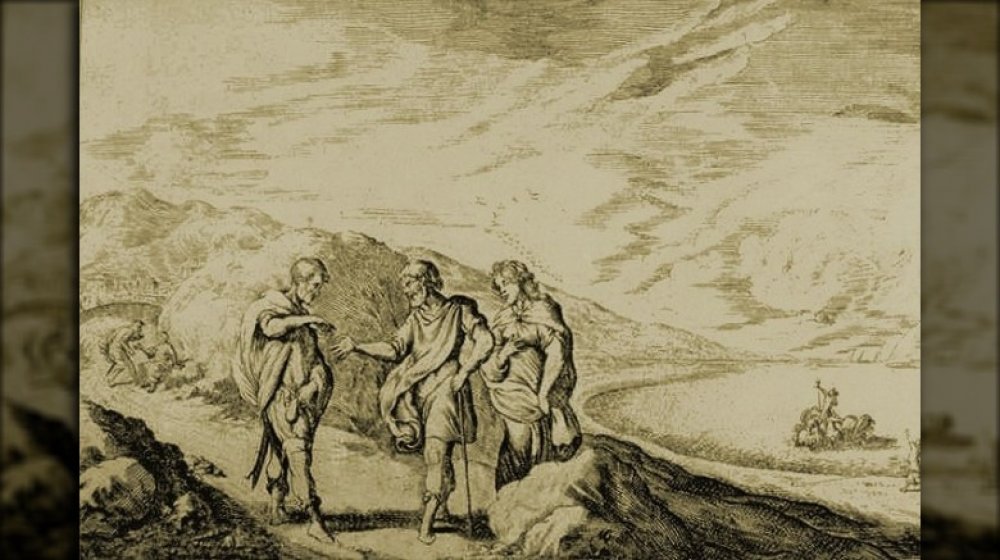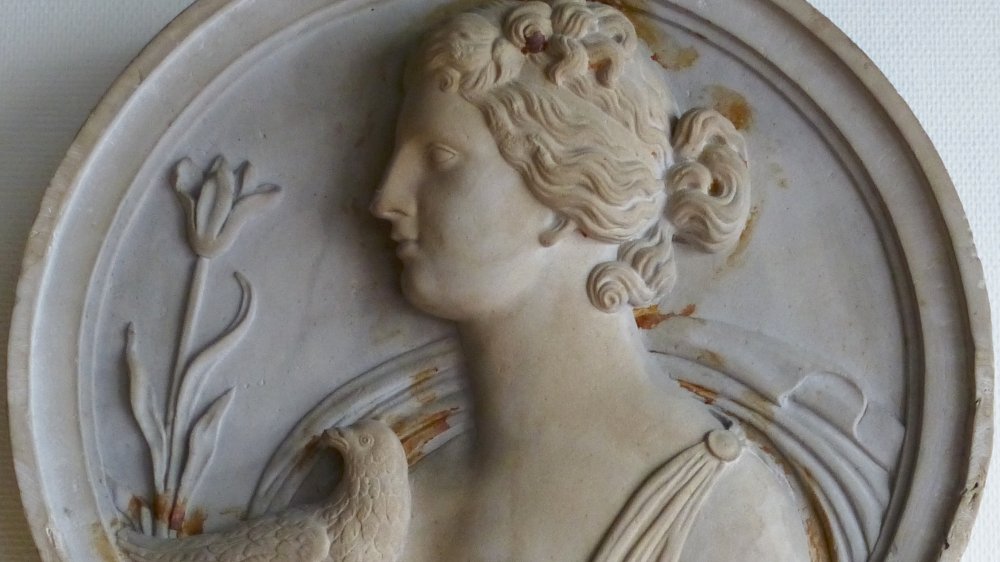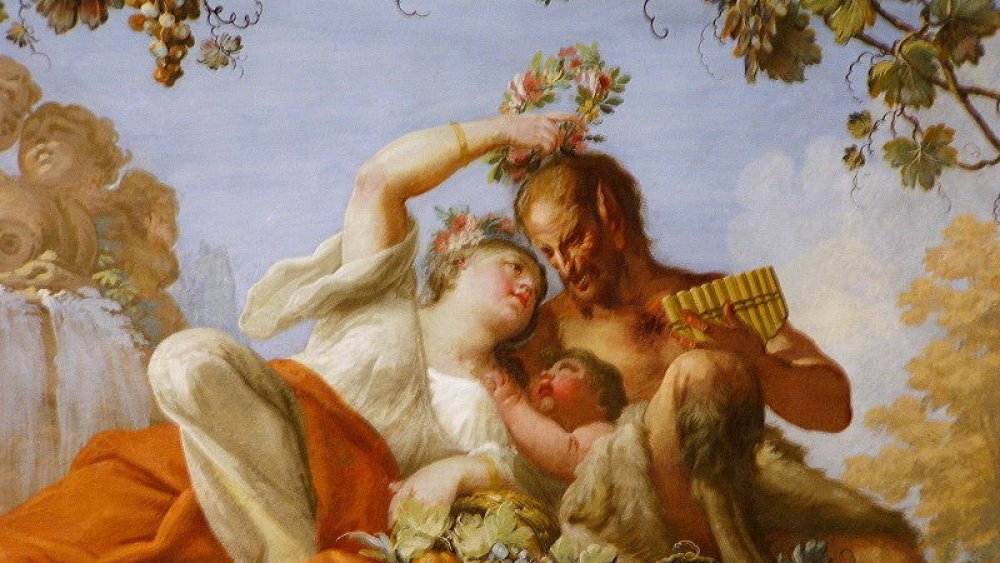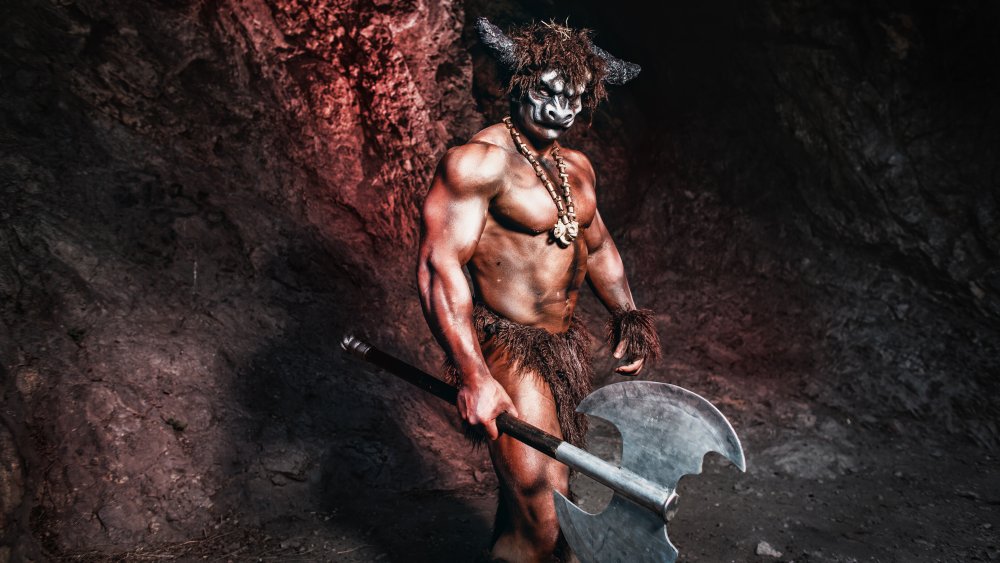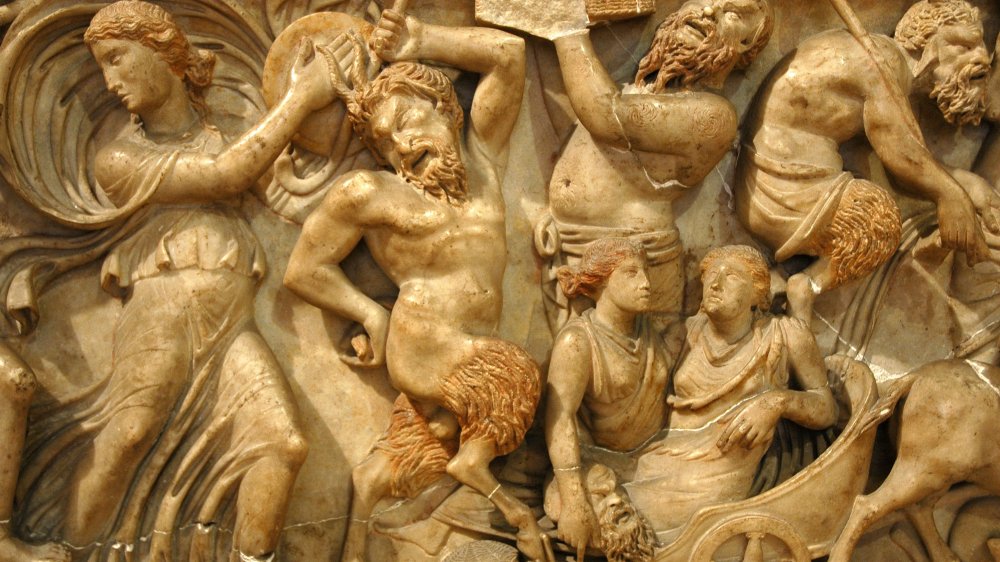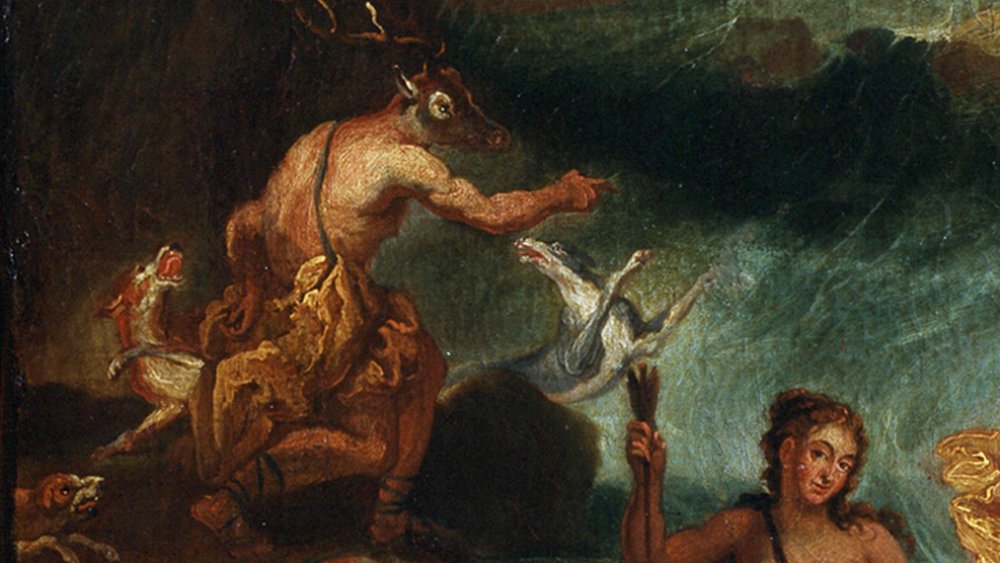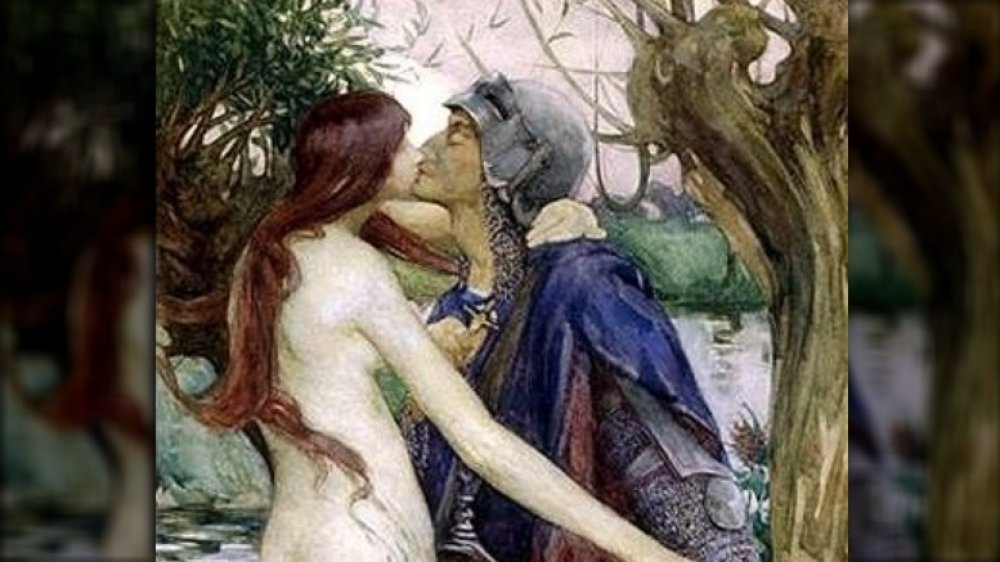Stories From Greek Mythology They Couldn't Teach You In School
The mythology of Ancient Greece is a fascinating glimpse into the world of our ancestors. It doesn't just tell us what they believed and how they worshiped: the stories also tell what they frowned upon, what they aspired to, and what they believed a person should never, ever do. Here, we're mostly talking about that last part.
When we learn about Greek mythology in a formal setting — like school — we hear a lot about the heroes. We hear about Herakles and his labors, the warriors of Troy, of Odysseus's journey, and Theseus's battle with the Minotaur. But you know what? You've only heard part of the story, because Theseus wasn't exactly a hero — he was a total jerk who abandoned Ariadne after she helped him escape the Labyrinth. There are two different versions of that story: in one, he leaves and she hangs herself. In another, he ditches her on Naxos and she's only saved from certain death by Dionysus (via Britannica). But you're never taught that, are you?
It turns out that there's a lot of little details — and entire stories — that are super dark, and just sort of slip through the cracks of higher learning. Let's get dark.
How many terrible things can fit into one story? This many!
This story starts with a king (Tereus of Thrace) marrying a princess (Procne of Athens). Nothing strange here, but it starts to go sideways when Procne, living in Thrace and desperately missing her beloved sister, sends for Philomena and brings her to live with them. Tereus starts to lust after his sister-in-law, and ultimately takes her into the nearby woods and has his way with her. Philomena threatens to tell her sister and Tereus decides to hold her captive in a cabin, cut out her tongue, and rape her again.
The story is nowhere near finished (via Colby). Philomena knows she needs to get word to Procne, so she weaves a tapestry that describes the whole thing. When Procne receives the tapestry, she rescues her sister and they plot revenge. It starts with killing and dismembering Itys, the son of Tereus and Procne. The pieces of his body are made into a stew, which is then served to Tereus for dinner. At the end of the meal he asks to see their son: Procne responds that Itys is in his stomach, and that's when Philomena walks into the room... carrying the boy's severed head.
Finally, the gods intervene: Philomena is turned into a nightingale, restoring her voice. Procne is turned into a swallow, and Tereus becomes a hoopoe — a very pretty bird with a crown... and an inability to sing (via From the Grapevine).
The messed-up birth of Dionysus
Dionysus! He's the fun god, right? Everyone knows he's the god of wine, and that's an important role. Less popularly told are stories about his horrible birth.
Like many Greek myths, there's a couple different versions of this one. Dionysus was also associated with the figure of Zagreus in the Orphic version of mythology (via Britannica), and that's where the first version comes in. It was Zagreus who, ThoughtCo. says, was born from a union between Persephone and Zeus... who was, weirdly, in snake form at the time. The ever-jealous Hera convinced the Titans to not only tear the baby into pieces, but to eat him. They absolutely did — except for his heart, which Athena took, turned into a drink, and gave to Semele. She then hooked up with Zeus again, and bore Dionysus — who was formed in part around the heart of Zagreus.
There's another part of the story, too. Hera turned her sights on Semele, whispering to her that she really should ask her lover to prove that he was divine, not just tell her that he was. Zeus agrees, but the mortal Semele was overwhelmed by his divine self and was promptly fried by thunderbolts. All that remained of her was the fetal Dionysus, who Zeus picked up, sewed into his leg, and kept there until he was ready to be born.
Tantalizing: An extra-special meal
Tantalus was an insanely rich but incredibly evil king of Sipylus. (His father was Zeus and his mother was the daughter of a pair of Titans, so maybe genetics had something to do with it.) According to Ancient History Encyclopedia, he was afforded certain privileges: namely, he was allowed entrance to Mount Olympus, where he joined the gods for their meals. There are three different stories about what happened next, but they all agree that he screwed up.
In the first, he told his fellow mortals what the gods had in store for them, and in another, he stole some of the gods' food — ambrosia and nectar — and passed it on to those same mortals. And the third... that's a bit more extreme.
Tantalus wanted to know if the gods really did know all, so he decided he was going to kill his son, Pelops, and cook him up for dinner. He served the gods his special Pelops stew, and no one ate it — save Demeter, who was distracted and mourning the loss of her daughter to the Underworld.
As punishment, Zeus condemned him to eternal hunger and thirst, even as he was forced to stand in a pool of water that drained when he tried to drink, and beneath a tree with fruit that hung just out of reach.
The strange fate of the King of the Giants
Zeus... was a weird guy. One of the things most have probably learned about in school is that the gods and the giants clashed in a massive war. The gods won, but what happened to some of the specific giants was possibly glossed over a bit.
Take Porphyrion. He was the king of the Gigantes of Pallene, and according to Theoi, he met his end with kind of a double whammy: he was hit with arrows and lightning from Herakles and Zeus, respectively. He went down on the battlefield, but... that's not the whole story.
Some sources say that he had his eye on Hera and intended to violate Zeus's queen in the most horrible of ways. But still... not the whole story.
Other sources say that he so fiercely desired Hera because Zeus made him lust after her. Just let that sink in: Zeus turned one of their enemies into a raging lust-monster, sent him after his wife, then swooped in to save the day.
The not-so-honorable side of Theseus
We learn about the story of the Minotaur, where Theseus slays the beast and plays the hero. We learn about Troy, too, where the beautiful Helen is at the center of a massive war. But we don't often hear about how these two stories overlap in a terrible way.
Theseus? Not a nice guy. According to one story (via ThoughtCo.), he was already the king of Athens when he made a bro pact with his buddy Pirithous: each one was going to pick a daughter of Zeus, abduct her, and defile her.
Theseus heard of Helen's beauty and chose her — and, at the time, she was still a teenager. He absolutely went through with it, and the assault produced a daughter named Iphigenia.
That name should sound vaguely familiar to anyone with a passing familiarity with the story of Troy. When the Greek fleet was halted by calm waters, Agamemnon sacrificed his daughter, Iphigenia, to Artemis in hopes of returning the winds so they could continue sailing to war (via Britannica). But Iphigenia wasn't really his daughter: Agamemnon and his wife had adopted her after Helen gave birth to her, to help preserve Helen's reputation.
Creepy innkeeper. Would give 0 stars.
The one thing you can say about Theseus is that he definitely gets around. According to one tale (via Old Greek Stories), he was making his way through the Parnes Mountains when he was approached by a kindly stranger, who invited him into his home for dinner and a nap.
He accepted, and when he sat down outside to wait for his room, he was approached by a young girl. The girl warned him: "Men call him Procrustes, or the Stretcher. [...] No one who comes into his house ever goes out again."
When Theseus asked why he was called the Stretcher, she replied that it was because he boasted that his iron bed would perfectly fit all who lie in it. And it would: if they're too short, he'd stretch them, and if they're too tall, he'd lop off their legs.
Procrustes returned, and Theseus followed him into his room. There, he saw the axes and the pulleys and the bloodstained floor, and confronted Procrustes. Procrustes admitted that it was all true, and Theseus? He threw the man into his own trap and left him there to die. On the plus side, he also freed those that Procrustes was holding as slaves, gave them his treasure, and sent them on their way, so he's not all bad.
The endless hunger of Erysichthon
Erysichthon was a Thessalian king who definitely forgot this crucial Rule Number 1: Respect the gods. When he decided he needed a banquet hall, he headed out into a nearby forest. That forest just happened to be sacred to Demeter, but he absolutely didn't care. He didn't even start caring when he got to a poplar tree in the middle of the grove, one that was sacred not only to Demeter, but the Nymphs. The tree cried out in pain, and Demeter came to walk the earth.
She condemned Erysichthon for his thoughtless disrespect and told him to go ahead... build his banquet hall, because he was going to need it.
So he built it, and he feasted... and he was still hungry. The more he ate and drank, the hungrier he became. He ate entire cows, he ate vermin, he ate the bits destined for the garbage, and still, he was hungry. He spent his entire fortune — even selling his daughter into slavery — until he was bankrupt and begging for scraps. And then? Then he started to eat himself, and ate more and more of his own flesh until he very literally ate himself to death (via Theoi).
Here's what happens when you disrespect Aphrodite
Aphrodite was the goddess of love, pleasure, and beauty, and many of her stories have to do with things like how she was born from sea foam (via Theoi). But it wasn't all fun and games — especially for those who refused to honor her.
The women of Lemnos were among those that didn't acknowledge her, and what did Aphrodite do? She cursed them to smell so bad that their husbands all left them, and when those husbands remarried, she drove them to get all murdery in revenge. Is that better or worse than what she did to Myrrha, a princess who — depending on the story — either refused to worship her, or whose mother suffered from a serious case of pride. The payback here? Aphrodite made her fall in love (or more accurately, lust) with her father. It turns out that Aphrodite was big on the incest: she made Hippolytos hook up with his stepmother, and forced the six brothers of Halia to take turns with their mother... to the embarrassment of their father, Poseidon.
Then, there were the Propoetides, the women living on the island of Kypros. They refused to acknowledge her divinity, so she delivered another curse on them: their passion became selling their own bodies for sex, and their hearts were transformed into stone. Gradually, their entire bodies were turned to stone as well.
What Pan is really playing on his pan flute
Aw, Pan, isn't he cute? He's the god of hunters and shepherds, the one that lives out in the farthest reaches of the fields and the mountains, the one that's half man, half goat. He's almost always portrayed as holding his pan pipes and playing music, and that's fun... right? Not exactly.
The Pan Flute Store says that the story behind just where the pan flute came from is pretty... stalkery. The legend says that Pan fell in love with a nymph named Syrinx, who wanted nothing to do with him. He continued to pursue her, until she felt she had no other option but to call on the gods for help.
And the gods? Their idea of help can sometimes leave a heck of a lot to be desired. Instead of telling Pan to go find someone else to pester, they turned the nymph — who was standing alongside the river Ladon — into reeds. Pan was all kinds of sad... until he heard the wind whistling through the reeds that were all that was left of his true love. So what's a lovesick god to do? He cut down the reeds, lashed them together, and named his new instrument Syrinx.
How the Minotaur came to be
Most are familiar with the Minotaur, the bull-headed creature that lives in the Labyrinth. Sure, he was just some kind of creation made by the gods, right...? Nope. According to Theoi, it started with a deal with Poseidon: Minos wanted to prove that he had the favor of the gods and that he should be the king of Crete, so he asked Poseidon to send him a bull from the sea. Minos promised that he would sacrifice the bull once it was on land, but it was such a magnificent creature that he sacrificed another and sent Poseidon's bull to his own herd of cattle.
This didn't go over well, and as payback, Poseidon cursed Minos's wife, Pasiphae, to lust after the bull. She didn't just lust after it, she went to the inventor Daedalus and asked him to build her a giant wooden cow that she could get inside and, well... get all frisky with the bull. She did, and the union produced the bull-headed Minotaur.
You could definitely argue that the whole thing was Minos' fault, so here's a bit of karma. Pasiphae — who was the immortal daughter of the sun, Helios — got sick of Minos and his affairs, and cursed him to spread not his seed, but snakes and scorpions that would invariably kill the women he seduced.
It's all fun and games until someone loses an eye. Or more.
Dionysus might be the god of wine, but he's also the god of things like madness... so it might seem like common sense that you don't want to mess with him. Bad things can happen... and for Pentheus, a king of Thebes, bad things definitely happened.
When the cult of Dionysus passed through his city, Pentheus called it an evil that needed to end. Needless to say, Dionysus wasn't a fan of that particular plan (via Theoi). He was dressed as one of his own priests when Pentheus arrested him and basically said that if the priest were to see his god, he needed to bring him down where Pentheus could stone him to death.
Bad idea. Dionysus escaped, and convinced Pentheus to see what was really going on at the mad dancing parties his followers were holding... so he did. There, he ran into his own mother, who definitely didn't recognize him when she started the party by ripping his arm right out of the socket. It just went downhill from there: the dancers, led by Pentheus' mother and aunt, ripped him to pieces, tossed the bloody bits around the group, and finally mounted his head on a stick and continued their dark, mad dance.
The bad ending of a Peeping Tom
Artemis was the virgin goddess of the hunt, and as such, she guarded her virginity very, very carefully. So, depending on the story, you might argue that Aktaion kind of had it coming when he decided to spy on the goddess as she bathed.
Theoi records some stories say that he only accidentally caught a glimpse of her as she was bathing, while others say he peeked on purpose... and in that case, he kind of deserved to be turned into a deer, and be ripped apart by his own hunting dogs. That's Olympian justice for you.
And here's the super sad part: some versions given Aktaion's hounds the main stage, even going as far as naming them all (and there's a lot of them). It's said that she didn't just turn him into a deer, but that she forced the dogs to kill him. When her influence over the pack disappeared, the dogs realized what they had done. Their howls of grief echoed across the land, until Kheiron — who had trained Aktaion to hunt — made a likeness of their master that made their grief manageable.
Caught in the middle of Zeus and Hera
Zeus had a ton of affairs and a ton of illegitimate children, and sometimes, the women who fell under his lustful gaze were caught between him and his ever-jealous, long-suffering wife in some terrible ways.
Take Lamia. She was the daughter of Poseidon and a queen of Libya when she caught Zeus's eye, and she was beautiful... until Hera got involved. There are a few different versions of Hera's revenge, but she's always said to have either stolen or murdered Lamia's children. The loss of her children drove her mad with grief, and Lamia gouged out her own eyes.
And here's where things get extra dark — with Zeus's attempt to... make things better? He granted Lamia new eyes, but they were the kind she could take out and put in again. Why? Who knows. He then turned her into a monster, usually described as a sort of woman with shark-like features. It varies on whether she was cursed to kidnap and murder any children she met or if she just decided to do that on her own, but the end result was the same: she ended as a murderous, monstrous creature that Theoi says became more widely known as a nightmarish horror.
